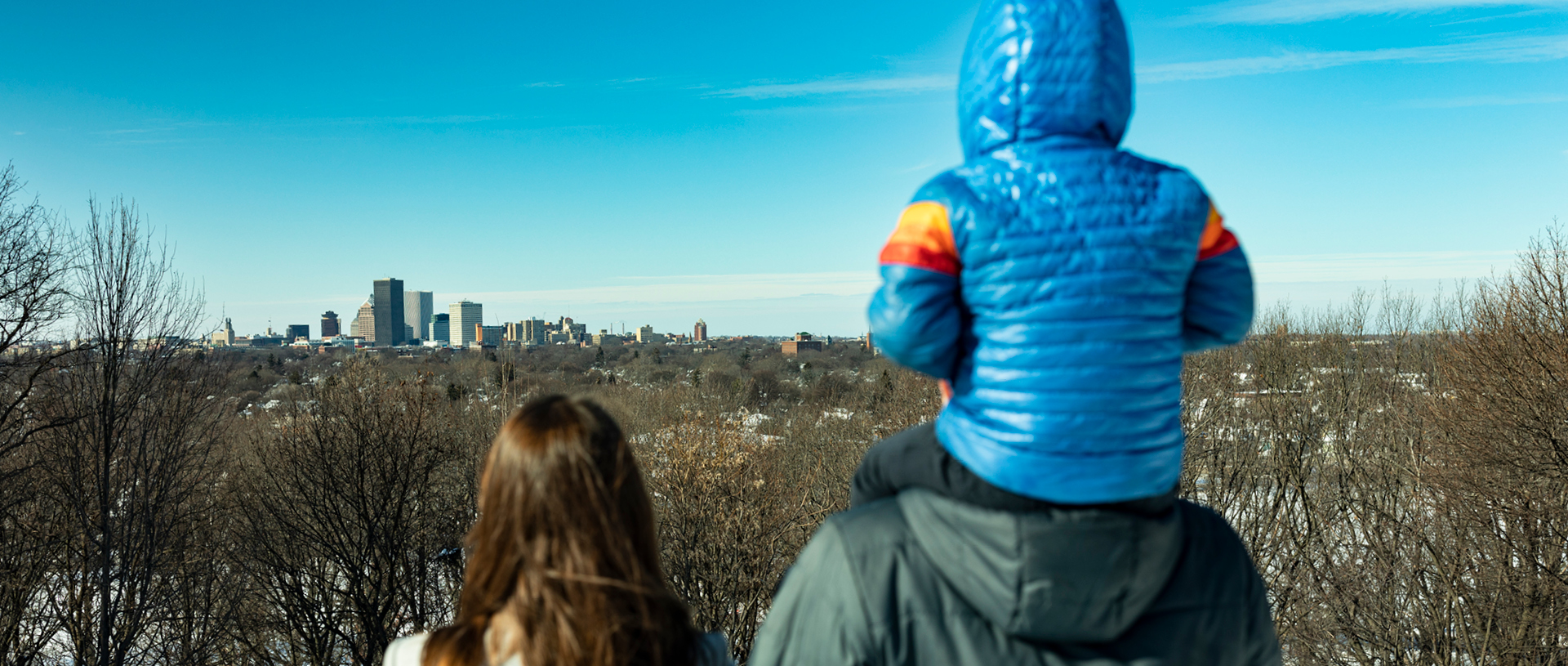
In the two-minute recording, six-year-old Olive sings over the strumming of her dad’s guitar.
Standing by the river, the birds in the trees
Watching the deer go up on our hill
There are hundreds of fish, thousands of fish
Of all the places, of all the places
They chose here, they chose here. . .
All the baby deer, they follow their mama
What a great mama, that sweet mama
There are hundreds of trails, thousands of trails
Of all the places, of all the places
We choose here, we choose here
We choose here, we choose here. . .
Olive wrote her song with a little help from her dad, Joel, for mom Autumn one afternoon. Olive’s gentle tune about the animals all around warmed Joel and Autumn’s hearts, as it would any parent, but did so especially for its unintended nod to their family’s own story of choosing home.
Autumn (PhD ’10) and Joel Gallegos Greenwich (MACCS ’09) were only meant to be in Rochester for a year. When Autumn was matched with the University of Rochester Medical Center for her internship—to cap off her time in Fuller’s PhD in psychology program—the two made what they thought would be a temporary move. The internship led to a two-year postdoc for Autumn and rolled over into Joel pursuing a PhD in education and human development, which meant another six years. Now, Autumn is assistant professor of psychiatry at the University of Rochester, while Joel adjuncts there and at Rochester Institute of Technology. They’re also involved with local organizations around the city, alongside raising their two children. Reflecting on what it’s meant to choose to make somewhere home, both Autumn and Joel exude a certain joy while emphasizing a weight of responsibility that comes with being truly present in a place.
“After my PhD program,” Joel says, “we were confronted with the possibility of whatever. There was no next big plan. That’s when we reflected on what we wanted—and on actually being here not because of ‘the next thing’ but because it was something we chose to do.” Autumn adds, “I had such a pull toward going back ‘home’ to California,” where she lived most of her life. “This process of making Rochester home took a long time. It took the good part of a decade. Trying to build a rootedness took recognizing that our daughter was five years old. This was her home. All of a sudden, you open your eyes, and you have a decade’s worth of friends and community and a network—and oh, man, we’ve been making these roots all along.”
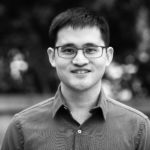
Jerome Blanco (MDiv ’16), editor in chief of FULLER magazine and Fuller’s senior content editor.
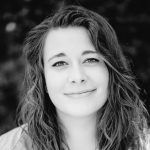
Lindsey Sheets is video editor, colorist, and photographer for FULLER studio.
In the two-minute recording, six-year-old Olive sings over the strumming of her dad’s guitar.
Standing by the river, the birds in the trees
Watching the deer go up on our hill
There are hundreds of fish, thousands of fish
Of all the places, of all the places
They chose here, they chose here. . .
All the baby deer, they follow their mama
What a great mama, that sweet mama
There are hundreds of trails, thousands of trails
Of all the places, of all the places
We choose here, we choose here
We choose here, we choose here. . .
Olive wrote her song with a little help from her dad, Joel, for mom Autumn one afternoon. Olive’s gentle tune about the animals all around warmed Joel and Autumn’s hearts, as it would any parent, but did so especially for its unintended nod to their family’s own story of choosing home.
Autumn (PhD ’10) and Joel Gallegos Greenwich (MACCS ’09) were only meant to be in Rochester for a year. When Autumn was matched with the University of Rochester Medical Center for her internship—to cap off her time in Fuller’s PhD in psychology program—the two made what they thought would be a temporary move. The internship led to a two-year postdoc for Autumn and rolled over into Joel pursuing a PhD in education and human development, which meant another six years. Now, Autumn is assistant professor of psychiatry at the University of Rochester, while Joel adjuncts there and at Rochester Institute of Technology. They’re also involved with local organizations around the city, alongside raising their two children. Reflecting on what it’s meant to choose to make somewhere home, both Autumn and Joel exude a certain joy while emphasizing a weight of responsibility that comes with being truly present in a place.
“After my PhD program,” Joel says, “we were confronted with the possibility of whatever. There was no next big plan. That’s when we reflected on what we wanted—and on actually being here not because of ‘the next thing’ but because it was something we chose to do.” Autumn adds, “I had such a pull toward going back ‘home’ to California,” where she lived most of her life. “This process of making Rochester home took a long time. It took the good part of a decade. Trying to build a rootedness took recognizing that our daughter was five years old. This was her home. All of a sudden, you open your eyes, and you have a decade’s worth of friends and community and a network—and oh, man, we’ve been making these roots all along.”
Jerome Blanco (MDiv ’16), editor in chief of FULLER magazine and Fuller’s senior content editor.
Lindsey Sheets is video editor, colorist, and photographer for FULLER studio.
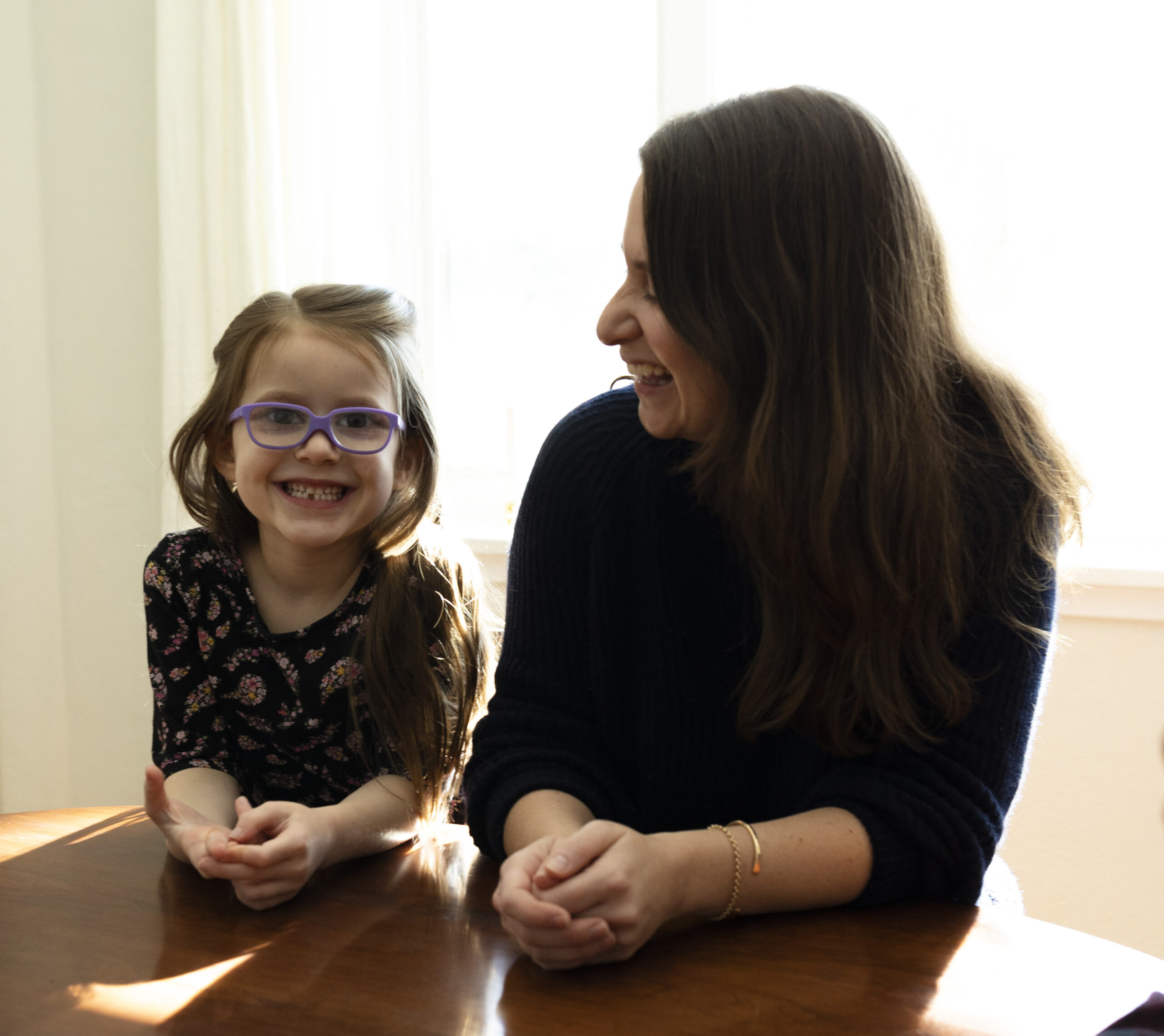

Autumn laughs at the irony of her slow realization in light of her area of research. “I teach and research mindfulness. A big piece of that is the practice of presence and allowing yourself to be where you are. That was my main struggle—allowing myself to be where we were.” But for both Autumn and Joel, to be somewhere does not mean simply existing in a certain place. Choosing home means becoming a living part of a community’s story.
For Autumn, this particularly plays out in her work as a psychologist and researcher. In fact, her original draw to the University of Rochester’s program was her interest in community-based participatory research, which she explains, involves “engaging the community in the work you’re doing—not just going in and out.” She says the work is about “really finding out what the community wants or needs, and being able to leverage your own knowledge and resources to benefit the community.” At the University of Rochester, she’s had the opportunity to lean into this, as Autumn currently works with local organizations that help survivors of interpersonal violence; she leverages her specialization as she studies how mindfulness can be helpful in the context of traumatic stress.
As for Joel, he was largely influenced by his upbringing in Brazil as the son of missionaries who served—and continue to serve—their local communities there by establishing orphanages, drug rehabilitation centers, and community centers. Joel, who emphasized in international development at Fuller, always wanted to do similar work and assumed he’d do so overseas; he shares how he’d been part of a student group at Fuller for students committing to serve abroad in some capacity. But he’s found this calling, a bit unexpectedly, in Rochester. Having studied education and human development in his doctoral program, with a particularly in-depth look at the city, Joel now teaches about the opportunity gap in education, cultural hegemony, and what it looks like on personal and societal levels to mitigate these power differentials—all through the specific lens of how these dynamics play out on the local stage.
During their years of putting down roots, Joel and Autumn have learned a tremendous amount about Rochester’s story. Joel says it’s impossible to ignore how segregation still has a hold in the city, where a decades-long history of redlining and other racist housing policies have led to far-reaching consequences like poor health and educational outcomes, particularly for the city’s Black community. “Rochester has the worst graduation rate for African American males in the country . . . and the highest childhood poverty rate among cities of comparable size,” says Joel, who was involved with a local high school as a part of his dissertation research, working with and learning from students labeled “over-age and under-credited” by the district and “most likely to drop out.” Having lived in several different places across North and South America over his life, Joel says, “Rochester is the most segregated place I’ve ever been.” As someone trained in education and development, he says it only makes sense to put what he knows to use where he is: “This is the place it’s most obvious in the nation. It made sense to be here.”
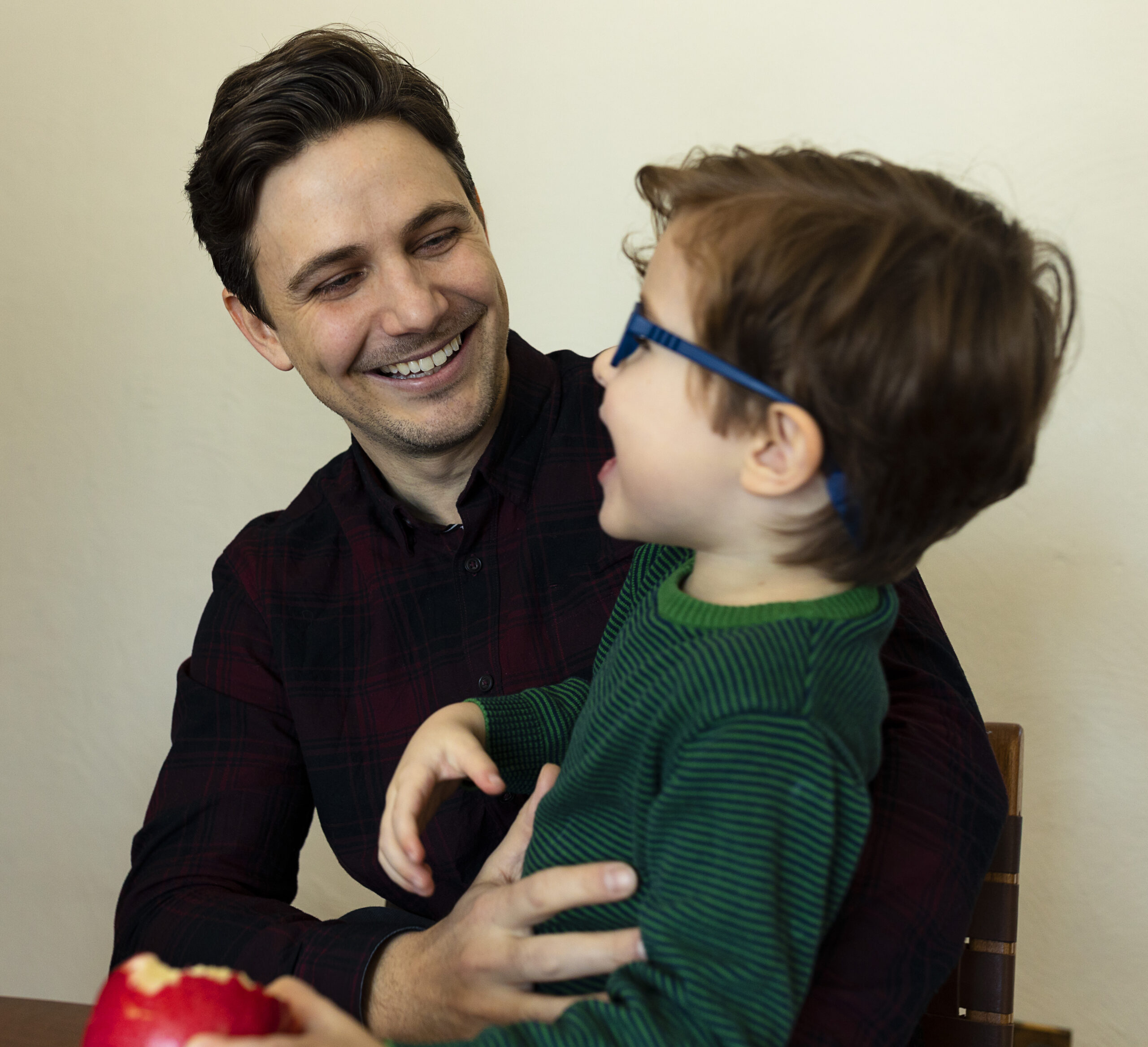

Autumn and Joel also point to Rochester’s wider story: its role in the history of suffrage, its connections with the underground railroad, its part in the rise and decline of the Rust Belt—not to mention the legacy of the Seneca people on whose land Rochester was built. All of it with its good and bad, they say, is a narrative they’ve jumped into by making a home here. Autumn shares, “Our daughter takes dance lessons at a place that was part of the underground railroad. There are plaques outside the building and a statue of Frederick Douglass she likes to pose with. And where I work is across the street from Susan B. Anthony’s gravestone. It’s a really fascinating place of so much rich history and justice movements.” Autumn and Joel believe it’s important to be a part of moving this unfurling story towards the good.
They care deeply that their children understand this as well. Autumn says, “Something that’s important to us is to live in the city, where people are working hard for change. We wanted to make sure Olive is in a school everyone has access to, and a school being diverse is a piece of that.” Olive’s school has a specific curriculum focused on the history of the place—lessons on the Rust Belt, segregation, the Seneca Nation—presented in a way that’s accessible to kids at a first-grade level.
As the city’s history continues to be written, their family now gets to be a part of that writing, alongside many others. Joel says, “For all the horrifying statistics Rochester has, it has an equal amount of really incredible stories and individuals who are fighting against the horrible.” In addition to their other work, Autumn and Joel have also committed to supporting the Community Land Trust, which, according to them, “represents one of the most effective, on-the-ground responses to our city’s history with redlining.” With “development without displacement” as their motto, the Community Land Trust beautifies and develops historically redlined neighborhoods while mitigating the displacement of residents brought on by gentrification. Additionally, Joel serves on the board of the M. K. Gandhi Institute for Nonviolence, which—among its many initiatives—partners with local schools to “mediate conflict in a restorative manner,” helping prevent student suspensions, a major factor in the graduation rate.
For Autumn and Joel, this work and this commitment to the city’s transformation begins with a choice to be present. Hearkening back to her focus on mindfulness, Autumn points to the writing of Henri Nouwen, whom she was introduced to during her time at Fuller. She says Nouwen’s work taught her about “having different stances to ourselves and the world and the people around us,” and that “in that process of paying attention—to opening yourself up to the possibility of acceptance and even awe—you can allow yourself to come close to something, like the place you live or the people around you.” That intimacy, she explains, clarifies both the beauty and suffering in a moment and in a space. And in the face of that reality, one comes to the point of saying, “I want to do something about it.”
“We’ve positioned ourselves to experience awe and compassion more deeply,” Joel says of their commitment to the city and to practicing presence where they are. And while they had no plans to stay for long when they first arrived those years ago, Autumn and Joel now have roots set firmly in Rochester’s soil and have made it home—becoming part of its history, its people, as well as its hopeful future. In the words of their daughter Olive, “Of all the places, they chose here.”
Dwight A. Radcliff Jr., academic dean for the William E. Pannell Center for Black Church Studies, introduces this issue’s theme of “justice” by reflecting on the words of the prophet Micah and of theologian Howard Thurman.